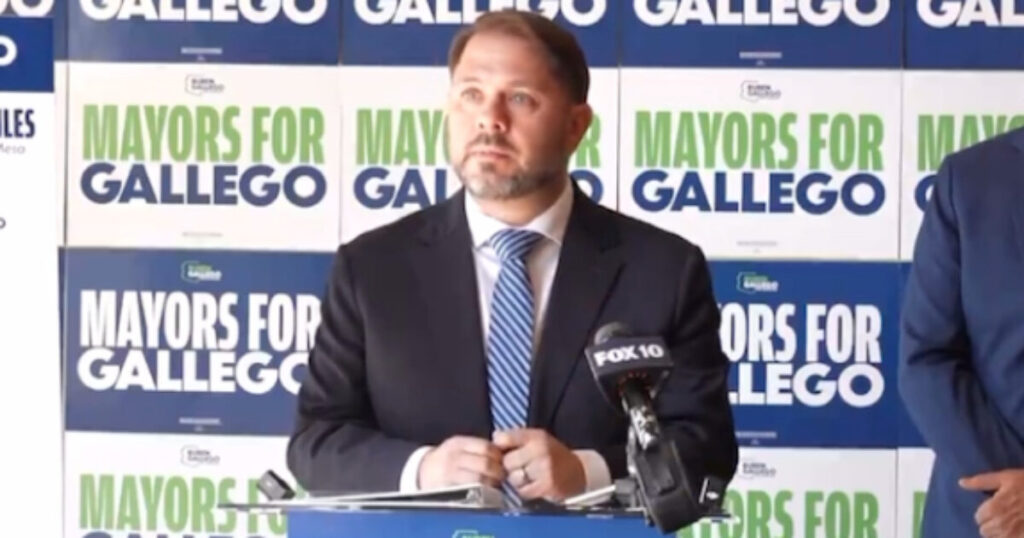Democrat Senate candidate Ruben Gallego recently faced questions about his familial connections to drug trafficking, particularly after Kari Lake brought to light his father’s criminal background. During an emotional interaction with a reporter, Gallego acknowledged that his father is a convicted drug dealer, a revelation that shocked many voters who may not have been familiar with his past. Instead of denying the allegations regarding his father’s ties to drug cartels, Gallego reacted defensively, shifting focus onto Lake, who has made headlines for portraying Gallego as being “controlled by the cartels.” This confrontation highlights a crucial line of attack that Lake intends to use in the race, emphasizing Gallego’s familial ties to organized crime as evidence that he cannot effectively tackle issues related to drug cartels and illegal immigration.
Gallego, who changed his name from Ruben Marinlarena in 2008, has argued that his decision was part of an effort to honor his mother, who had been the primary caregiver after his father abandoned the family. He has claimed a deep commitment to helping single mothers, like his own, by enacting policies aimed at supporting families disadvantaged by similar circumstances. However, Gallego’s narrative raises questions about his political motivations; critics argue that his name change could have been a strategic move to obscure his father’s reputation from potential voters. While he has expressed pride in his mother’s struggles and achievements, his past actions, including abandoning his pregnant wife, cast a shadow over this narrative and suggest a pattern of familial rejections that complicate his claims of wanting to support family-centered policies.
Additionally, critics have drawn parallels between Gallego’s political positions and his father’s criminal background. Although he claims to distance himself from his father’s past, Gallego’s voting records suggest a permissiveness toward illegal immigration and related issues that some interpret as sympathetic to cartel activities. His votes against stricter immigration enforcement and his support for sanctuary cities have led opponents to label him as pro-cartel or at least complicit through inaction. Such criticisms are particularly potent in the context of tackling drug-related violence and cartel influence along the southern border of the United States, where many voters feel that a tougher stance is necessary.
Gallego’s open opposition to the construction of a Trump-era border wall and his dismissive comments regarding illegal immigration further compound the concerns expressed by Lake and her supporters. His characterization of border security measures as “stupid” and “useless” speaks to a broader rhetoric that some perceive as neglecting public safety issues in favor of more lenient immigration policies that might align with cartel interests. The implications of this stance resonate with voters who prioritize national security and community safety in their decision-making processes, creating a narrative that paints Gallego as either out of touch with voter concerns or intentionally aligned with organizations that contribute to societal instability.
Media scrutiny, including comments from investigative journalist Laura Loomer, points toward the potential for deeper investigations into Gallego’s financial records and connections, specifically regarding Mexico’s drug cartels. Questions about whether Gallego may have any unreported affiliations or tacit agreements with such networks have emerged, illuminating the fine line he walks in his political career. The implications of having a parent with documented cartel ties raise ethical questions for constituents who expect transparency and integrity from their elected officials. In a politically charged atmosphere, where allegations of corruption and complicity can dramatically sway public perception, Gallego’s past could become a central issue in the campaign, affecting his viability as a candidate.
Ultimately, the dynamic between Gallego and Lake encapsulates a broader debate about immigration policy and drug trafficking in contemporary American politics. Lake’s framing of Gallego as weak on cartel-related issues seeks not only to undermine his credibility but also to rally conservative voters concerned about crime and illegal immigration. Gallego’s personal narrative of overcoming hardship presents a compelling story on the surface, but critics’ persistent allegations regarding his family’s heritage threaten to unravel the image he wishes to project. With the election approaching, both candidates are likely to engage in escalating rhetoric, positioning their histories and values in stark contrast to appeal to a divided electorate grappling with the complexities of crime, justice, and immigration within the state of Arizona and beyond.

